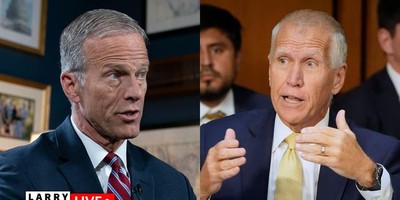From the commentary in the mainstream media, I thought there had been a coup d'etat in Washington.
The New York Times said what happened "strikes at the heart of democracy."
The Washington Post quoted an authority who warned it "threatens to undermine the integrity of elected institutions across the nation."
No, not the Scott Brown victory. The media were upset because the U.S. Supreme Court ruled that forbidding corporations and labor unions to spend money on political speech before elections is unconstitutional. A horrendous section of the abomination known as McCain-Feingold campaign-finance "reform" had bitten the dust. It was long overdue.

The case grew out of a documentary critical of Hillary Clinton that Citizens United, a nonprofit corporation, planned to show on cable television during the 2008 presidential primary season. The law said that was illegal.
The 5-4 majority consisted of the four conservative justices and the swing justice, Anthony Kennedy, who wrote the main opinion. He couldn't have been more clear: "When Government seeks to use its full power, including the criminal law, to command where a person may get his or her information or what distrusted source he or she may not hear, it uses censorship to control thought. This is unlawful. ... The First Amendment confirms the freedom to think for ourselves."
He also said, "Because speech is an essential mechanism of democracy -- it is the means to hold officials accountable to the people -- political speech must prevail against laws that would suppress it."
And, "We find no basis for the proposition that, in the context of political speech, the Government may impose restrictions on certain disfavored speakers."
Recommended
Of course, the "progressive media" condemned the majority for its judicial activism because the ruling overturned two precedents. I thought progressives favored judicial activism and dumping bad precedents. I also thought they favored free speech. Wrong. (To its credit, the ACLU was on Citizen United's side.)
It depends on whose ox is gored.
In condemning the decision, the offended progressives engaged in amazing mental contortions. It "was wrong because nothing in the First Amendment dictates that corporations must be treated identically to people," the Post editorialist wrote.
I guess the writer is unfamiliar with the obscure opening phrase of the First Amendment: "Congress shall make no law." And apparently the outraged progressives don't realize that corporations and unions are associations of individual who have rights. Dissenting Justice John Paul Stevens didn't get it, either.
The media outrage is almost funny. Under McCain-Feingold, media corporations were exempt from the prohibition -- which suits the Washington Post and New York Times just fine. But people with common sense already knew what Justice Kennedy found it necessary to say: "This differential treatment (between media and nonmedia corporations) cannot be squared with the First Amendment."
So now we are being served dire warnings that "corporate money ... may now overwhelm both the contributions of individuals and the faith they may harbor in their democracy." (Are similarly freed wealthy labor unions potted plants?) But the same Post editorial conceded that corporate money was "never lacking in the American political process." So what's the difference?
Besides, as John Samples and Ilya Shapiro of the Cato Institute write: "Before McCain-Feingold, both (corporations and unions) could spend freely on advertising about candidates for federal office. Such spending made up a relatively small part of election-related speech, and no one group dominated ... the political arena."
One need not be a fan of big corporations -- which in today's interventionist economy benefit from many government privileges -- to see that restrictions on anyone's speech are dangerous. A government lawyer last year said that even corporate-funded books favoring or opposing candidates could be prohibited under McCain-Feingold. That should scare progressives -- especially since the Federal Election Commission once had an anti-Bush book written by George Soros under scrutiny.
It is shameful that progressives are willing to throw free speech under the bus in their devotion to big government.
There is a simple way to get corporate money out of politics: get the government out of our lives and economic affairs. If government has no favors to sell, no one will spend money trying to win them.

























Join the conversation as a VIP Member